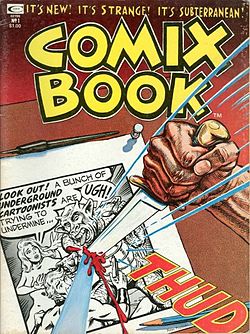- Comix Book
-
Comix Book 
Comix Book #1 (Oct. 1974). Artwork by Peter Poplaski.Publication information Publisher Marvel Comics
Kitchen Sink PressSchedule Irregular Format anthology Genre Underground Publication date Oct. 1974 – July 1976 Number of issues 5 Creative team Artist(s) Joel Beck, Howard Cruse, Kim Deitch, Justin Green, Will Fowler, Gary Hallgren, Denis Kitchen, Trina Robbins, Art Spiegelman, Skip Williamson, S. Clay Wilson Creator(s) Denis Kitchen Editor(s) Denis Kitchen Comix Book was an underground comic book series published from 1974–1976, originally by Marvel Comics. It was the first underground comic to be published by a mainstream publisher. Edited by Denis Kitchen, Comix Book featured work by such underground luminaries as Justin Green, Kim Deitch, Trina Robbins, Art Spiegelman, and S. Clay Wilson. While it did not depict the explicit content that was often featured in underground comix, it was more socially relevant than anything Marvel had previously published.[1]
Contents
Publication history
In 1973, Marvel publisher Stan Lee became attracted to the energy and cutting-edge art styles of the underground comix movement (which, ironically, by this period was already beginning to wane).[1] Interested in capitalizing on the genre, Lee approached artist and Kitchen Sink Press publisher Denis Kitchen about packaging an underground-style publication for Marvel. Lee requested only that contributors would submit significantly less explicit work, appropriate for newsstands sales.[2] Kitchen, eager to broaden the economic and distribution opportunities for underground cartoonists, agreed to Lee's proposal.[3]
Lee, apprehensive about push-back from fans and distributors,[4] insisted that Comix Book not carry the Marvel name, instead being released by Magazine Management Co. (a Marvel Comics company). Lee himself was only credited on the masthead as "instigator."[4] He and Kitchen agreed to produce a black-and-white oversize magazine similar to that of the contemporaneous Marvel imprint Curtis Magazines. As with the Curtis publications, the format allowed Marvel to dispense with the restrictions of the Comics Code Authority, thereby creating a freer creative space more akin to the no-holds-barred ethos of the underground. In addition, like most underground comics, Comix Book carried no advertising. Kitchen was also able to win a number of unprecedented concessions for his contributors, including the return of all artwork, and eventually allowing artists to keep their copyrights.[3]
Comix Book #1 was launched with a cover-date of Oct. 1974. In addition to comics, issues of Comix Book usually featured text pieces like Kitchen editorials, interviews, and a letters page. Unfortunately, Comix Book either failed to find its audience, was mishandled by baffled newsstand distributors, or both. Lee cancelled the book when issue #3 hit the newsstands.[5] Kitchen, however, had assembled two additional issues. After a year of negotiations, he persuaded Marvel to let his own Kitchen Sink Press publish issues #4 and 5 in 1976.[4]
Notes
- ^ a b Sabin, Roger (1996). "Going underground". Comics, Comix & Graphic Novels: A History Of Comic Art. London, United Kingdom: Phaidon Press. pp. 92–128.
- ^ Sabin, Roger (1996). "Comical comics". Comics, Comix & Graphic Novels: A History Of Comic Art. London, United Kingdom: Phaidon Press. ISBN 0714830089.
- ^ a b Manning, Shaun. "Denis Kitchen Discusses His 'Oddly Compelling' Art Book," Comic Book Resources (Mar. 18, 2010).
- ^ a b c Cooke, Jon B. "CBA Interview: Comix Book: A Marvel Oddity: Denis Kitchen Talks About Stan's Short Strange Trip," Comic Book Artist Collection, Volume 3. (TwoMorrows Publishing, 2005), pp. 100–106.
- ^ Sabin, Roger (1996). "Picking up the pieces". Comics, Comix & Graphic Novels: A History of Comic Art. London, United Kingdom: Phaidon Press. p. 151. ISBN 0714830089.
References
- Comix Book (Marvel) at the Grand Comics Database
- Comix Book (Kitchen Sink) at the Grand Comics Database
- Comix Book at the Comic Book DB
External links
- Comix Book No. 5 at DenisKitchen.com
Underground comix works Series American Splendor • Anarchy Comics • Arcade • Cherry • Comix Book • Fabulous Furry Freak Brothers • Gay Comix • Gothic Blimp Works • Omaha the Cat Dancer • The Rip Off Review of Western Culture • Snappy Sammy Smoot • Tits & Clits Comix • Weirdo • Wimmen's Comix • witzend • Zap ComixStories Books BreakdownsCategories:- Marvel Comics titles
- 1974 comic debuts
- Underground comix
- Kitchen Sink Press titles
Wikimedia Foundation. 2010.
